Guglielmo Marconi: Celebrating the father of radio
Contributing Editor
Decades before innovators like Steve Jobs and Bill Gates arrived on the technology scene, there was already someone changing the world as we knew it. Guglielmo Marconi.
This Irish-Italian inventor may be one of the most important men in the history of radio. He laid the foundation for the way that we connect to people today and transformed the entertainment landscape forever.
Not only was Marconi the first person to communicate on a global level, but he was also one of the first people to push the limits of what was truly possible with radio waves.
He may not have been the best inventor of his era, but Guglielmo was the man responsible for the evolution of much of the tech you use today, including baby monitors, smartphones, and Bluetooth.
The tale of Guglielmo Marconi is a story of a 22-year-old pioneer, unappreciated in his homeland and ready to span the globe in search of recognition.
Within a single year, this man named the “father of radio” accelerated the growth of technology by more than 20 times.
So, who is Guglielmo Marconi?
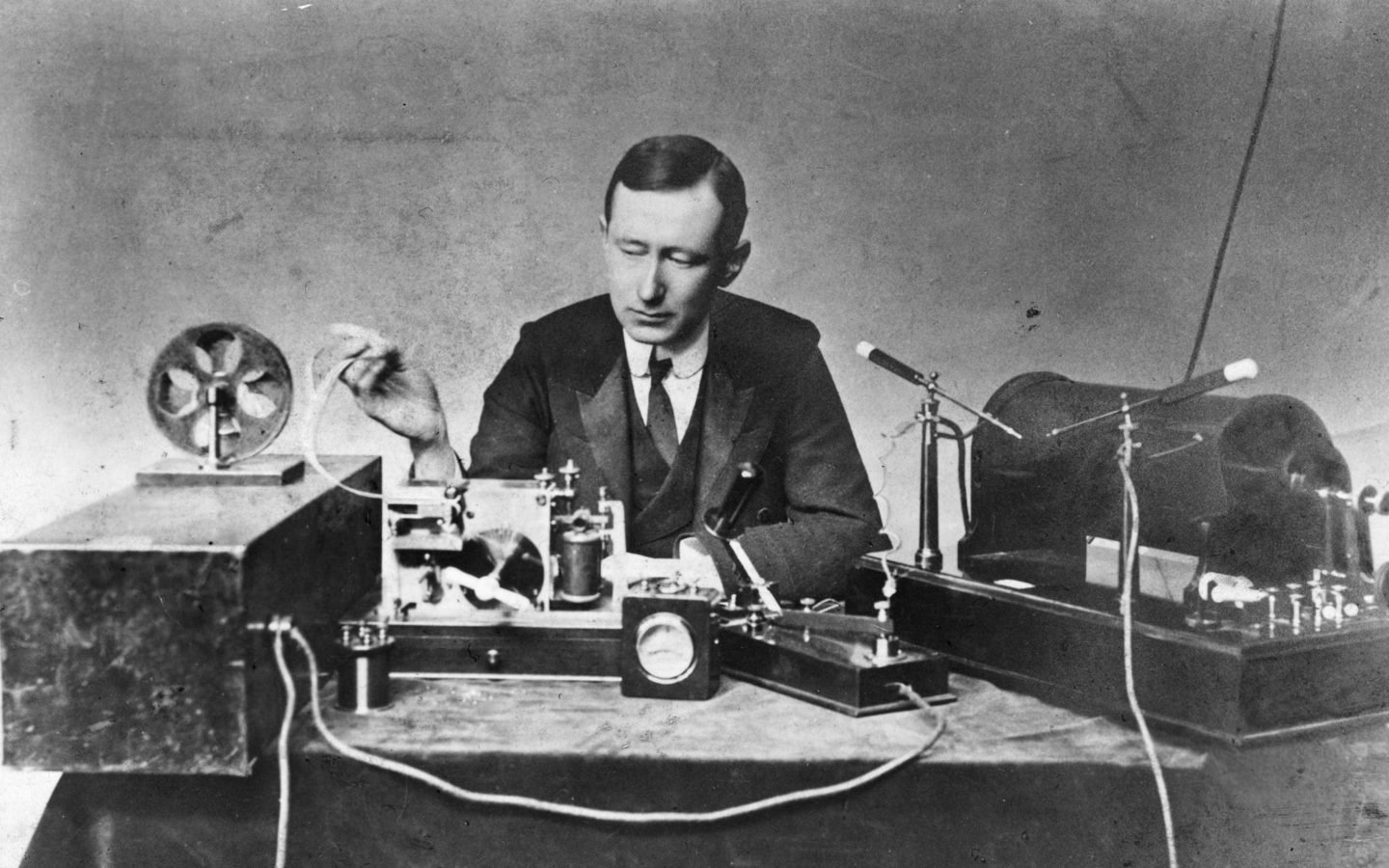
Who is Guglielmo Marconi?
Guglielmo Marconi biography
Guglielmo Marconi was born on the 25th of April 1874 in Bologna, Italy.
Marconi’s father was a wealthy landowner, while his mother was a descendant of Ireland’s Jameson family of distillers.
This Italian physicist and inventor is best known for his contributions to the world of radio waves and wireless communication. This innovation constitutes the foundation of almost all long-distance radio connections.
Half Irish (on his mother’s side) and half Italian (on his father’s side), Marconi had a passion for technology from an early age.
He pursued technical academics in Leghorn, where he studied physics and explored the possibilities of electromagnetic radio waves, pioneered by Heinrich Hertz and James Clerk Maxwell.
Marconi also found inspiration in the incredible work of Sir Oliver Lodge – a man known for his research on electricity and lightning.
By 1894, Marconi had already begun experimenting on his father’s estate with induction coils, increasing voltages, and spark discharges managed by Morse keys.
Following a series of preliminary experiments, Guglielmo found a way to improve the coherence of messages delivered over radio waves. Eventually, using systematic testing, he was able to prove the ability to increase signal ranges using vertical aerials.
Though his initial achievements weren’t huge, they were enough to convince Marconi that he had stumbled across something great.
His experiments helped him to establish some of his initial inventions, which included an aerial capable of radiating electrical energy into a singularly focused beam.
When Guglielmo Marconi’s invention was presented to the technology companies in Italy, they received little to no support.
However, Guglielmo wasn’t willing to give up on himself. Instead, he traveled to London in 1896, where a man called Sir William Preece (Post Office Chief Engineer) helped him file his first patent.
This was after successfully sending and receiving Morse code-based radio signals over a distance of about 4 miles (6 kilometers) in England.
Marconi was granted the first patent in wireless telegraphy the same year.
In 1896 and 1897, Marconi demonstrated the potential of his new signal-boosting tools to companies across the UK. He was able to send signals over 4 miles (6 kilometers) in Salisbury and across 9 miles (14 kilometers) over the British Channel.
These tests, combined with lectures from Sir Preece, helped Guglielmo Marconi to get the attention he deserved, both in England and abroad. By 1897, Marconi returned to Italy to highlight what his technology could do for Italian warships.
According to Guglielmo Marconi’s biography entries, there was still a lot of skepticism in Italy about whether his radio technology was really useful.
However, Marconi’s cousin, Jameson Davis, helped him to get the attention he needed by forming Marconi’s first company, “Marconi’s Wireless Telegraph Company, Ltd.”
At first, Marconi’s company focused on simply showing people what was possible with wireless telegraph and signals.
However, in September 1899, Guglielmo equipped two American ships with his technology so that they could report their progress in a yacht race to New York City newspapers. The success of the demonstration generated interest in Marconi’s invention.
The following year, another business named the Marconi International Marine Communication Company emerged, helping to install communication services between land and ship stations.
Marconi also filed his famous patent in 1900. The 7777 copyright awarded Marconi ownership of various improvements to wireless telegraphy.
In 1943, the US Supreme Court eventually overturned this patent, saying that Nikola Tesla, Oliver Lodge, and John Stone had priority in the development of radio tools.
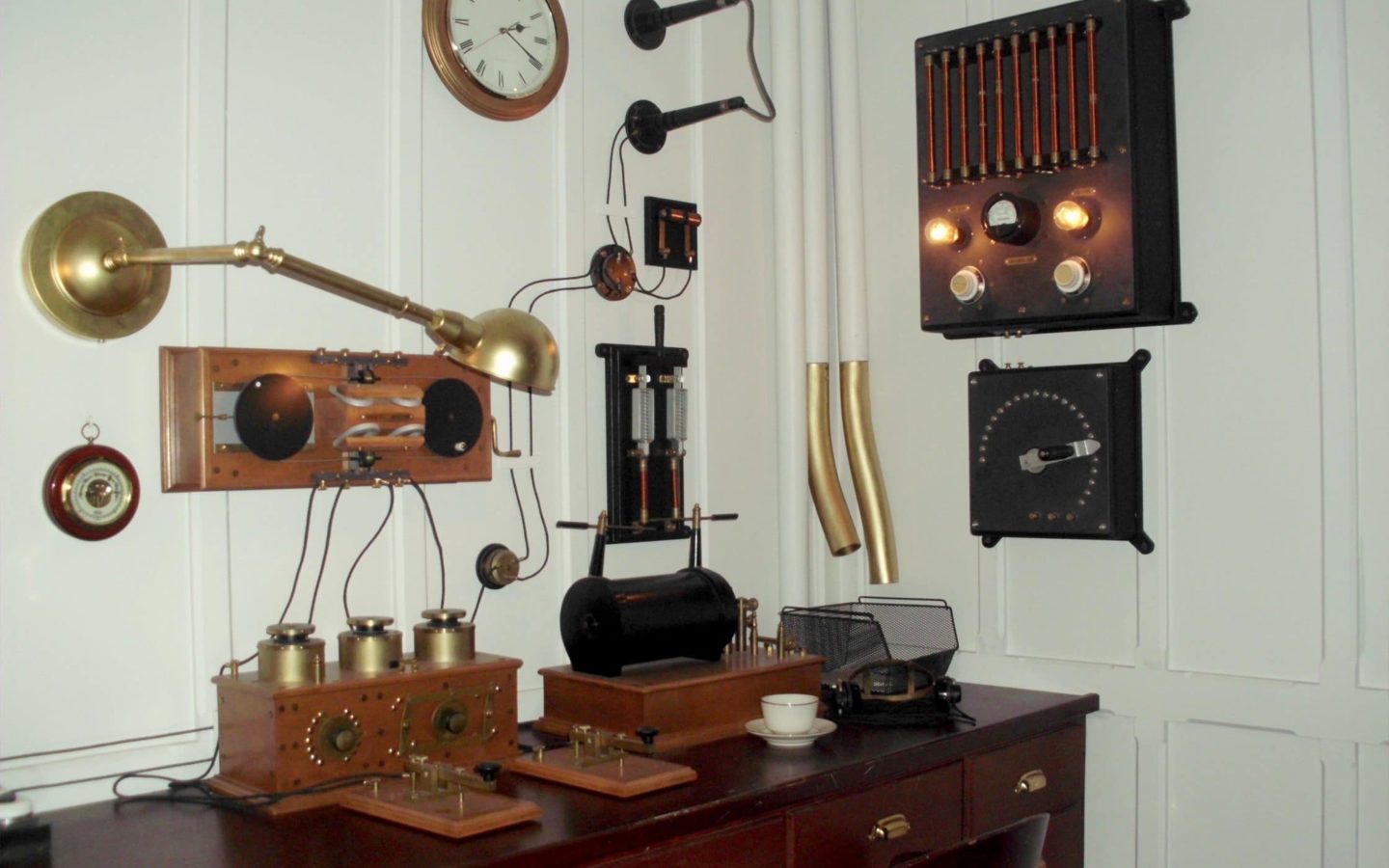
What is Guglielmo Marconi famous for?
Searching for the name Guglielmo Marconi on Google will bring you to several questions, including:
- What did Guglielmo Marconi invent?
- When did Guglielmo Marconi invent the radio?
- Why did Guglielmo Marconi invent the radio?
…and so on.
Despite some controversy over what Marconi did for the evolution of communications, Guglielmo is still widely regarded as a critical contributor to the world of radio waves and communications.
In 1901, Marconi successfully sent signals across the Atlantic Ocean from Cornwall in England. This all-important achievement immediately changed everything we thought we knew about communication.
Scientists discovered that there was still a lot to be learned about how radio waves can be used across the globe. For many, 1901 was the beginning of a long journey in radio broadcasting, communications, and more.
In 1902, Marconi followed up on his 7777 patent with another invention.
This time, he was requesting a license for the magnetic detector in which a moving band of iron wires could cause a click in a telephone receiver connected to a magnetized system.
A concept like that might not sound very exciting at first, but it was crucial to Morse code communications. In the next 3 years, Marconi also patented the horizontal directional aerial to improve the quality of global communications.
By 1910, Marconi was sending messages from Ireland (Clifden) to Buenos Aires at a distance of over 6,000 miles (9,656.06 kilometers). Two years later, the Marconi radio story continued to evolve, with innovations that improved the reception of long-distance radio transmissions.
In September 1918, Marconi sent the first radio message from England to Australia.
Thanks to a vast range of inventions and patents, it’s difficult to say for certain what Marconi’s most famous accomplishment is. Perhaps the reason that Marconi is credited as the father of radio is because he brought unlimited passion to the industry.
Even 20 years after Marconi’s initial experiments with reflectors, he continued to work on radio frequencies, improving the sound quality and radio transmission accuracy of long-distance messages.
Eventually, he created the Shortwave Wireless communication system, which is the basis for most of the modern radio communication we use today.
In 1942, the Guglielmo Marconi invention became the center of the UK Post Office’s shortwave wireless communication strategy. A few years later, Marconi installed a radiotelephone system at the Pope’s palace in Castel Gandolfo and Vatican City.
Guglielmo Marconi awards
So, why was the radio invented?
Although the Guglielmo Marconi biography starts with a lack of recognition and interest, Marconi eventually received the attention he deserved. For many, he’s still regarded as the man who invented the radio.
Marconi also received many honors and honorary degrees over the years, including:
- 1909: The Nobel Prize for Physics, which he shared with Karl Braun for contributions to radio communications.
- 1920: The IEEE Medal of Honour (previously the IRE Medal of Honor).
- 1923: The John Fritz Medal.
- 1927: The Silver Medal of the International Mark Twain Society.
- 1932: The Lord Kelvin Medal for the Institute of Civil Engineering and the John Scott Legacy Medal.

Who invented the radio? Tesla vs. Marconi
It’s hard to answer the question “Who is Guglielmo Marconi?” without considering the controversy between Guglielmo Marconi and Nikola Tesla.
While many people credit Marconi as being the man who invented the radio, there are a few arguments out there.
If you look into the question “When was the radio invented?” the most common story states that Guglielmo Marconi invented radio when he hosted public wireless transmission demonstrations in 1885.
Marconi also received the first wireless telegraphy patent in 1896. License 7777 has since become famous for marking the official creation of radio.
Even the Nobel Prize society recognized Guglielmo Marconi’s invention as being a pioneering part of communications history.
However, fans of Nikola Tesla regularly attack Guglielmo Marconi’s claim to be the creator of the radio. Tesla is most famously known for inventing the Tesla coil – which is essential in the transmission of radio waves.
This coil was initially designed in 1891, and four years later, it could transmit wireless signals over a distance of at least 40 miles (64.37 kilometers). Unfortunately, a fire destroyed Tesla’s lab in the same year, and it took another 3 years for the scientist to rebuild.
For a while, Marconi’s patents for radio technology were declined by the Patent Office, because they relied too heavily on work from a handful of inventors, including Tesla.
However, in 1896, the Office changed its mind and gave Marconi the patent for the invention of radio.
Since then, however, decisions have been changed yet again. In 1943, the US Supreme Court overturned the 7777 patents, once again giving recognition to Tesla and other inventors like him.
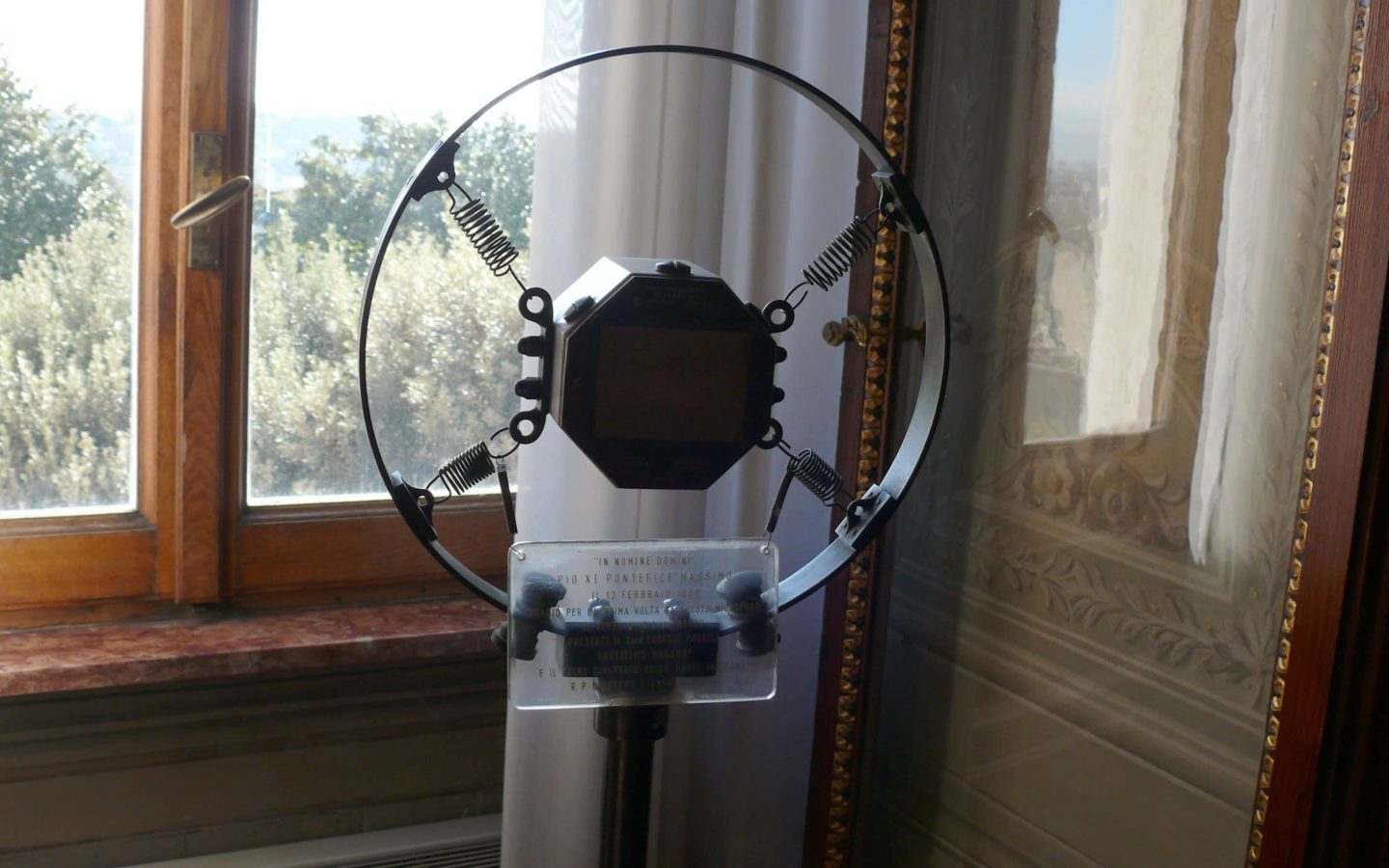
Why did Guglielmo Marconi invent the radio?
If you’re one of the many people who believe that Guglielmo Marconi did invent the radio, then you might be wondering why he created this technology in the first place.
Marconi changed the way that we live forever, regardless of how you feel about his battle against Tesla. According to many publications over the years, Guglielmo invented the radio to do his part in the fight against war.
In fact, in 1912, Marconi shared in an interview with the Technical World Magazine that he hoped his wireless telegraph would create a “world without war.”
So, why would Guglielmo Marconi’s radio waves eliminate war?
In Marconi’s opinion, they gave people a better way to communicate, and therefore reduced the need for fighting. It was an adorable concept if you think about it – and it wasn’t the only evidence that Marconi had big dreams for the age of radio.
Marconi’s radio innovations also led him to explore other ideas, like whether it would be possible to transfer power and energy using similar methods to radio communication.
On the plus side, Marconi’s dreams of saving lives with radio were partially recognized in 1912, when he was responsible for helping to save many of the survivors of the Titanic disaster.
According to many experts at the time, without Marconi radio on the Titanic, it would have been impossible to find the survivors who needed help after the Titanic sank.
Around the world, the same technology also helped protect and serve people on multiple lesser-known ships, too. In the case of the Titanic, two Marconi radio operators working in the radio room sent out distress wireless signals after the collision with the famous iceberg.
In newspapers after that day, many reports portrayed Marconi as a version of Poseidon, lifting lifeboats from the water and getting them to safety.
No matter how you felt about Marconi during that era, it was difficult to argue with the fact that his dedication and persistence had helped to save lives.
If Marconi hadn’t pushed to have his radio systems implemented into ships, the survivors from the Titanic would have frozen to death in the ocean water.
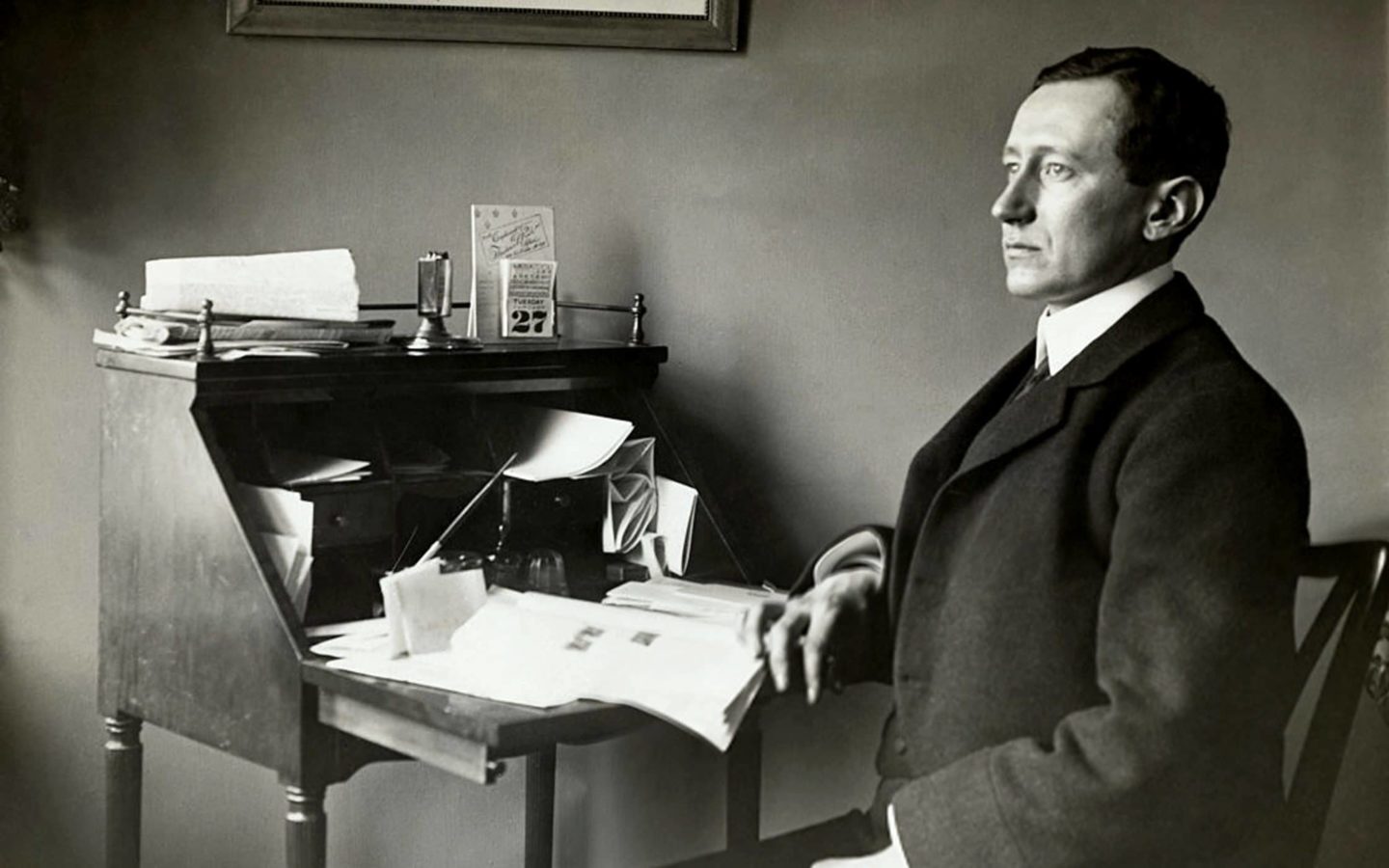
Guglielmo Marconi facts and interesting tidbits
Guglielmo Marconi was more than just the father of radio. This incredible inventor was also a husband, a pioneer, and a dedicated learner.
When you’re looking for answers to questions like “When did Guglielmo Marconi invent the radio?” it’s easy to overlook some of the other interesting facts and insights about this man that are available online.
With that in mind, we’ve put together a list of some of our favorite Guglielmo Marconi facts to help you expand your knowledge:
1. Marconi never received a formal education in Science
You’d think that the person known as the man who invented the radio would have more of an official background in science. However, Marconi mainly studied with a series of private tutors and educators.
Guglielmo had something of a privileged childhood. His father was an aristocrat, and his mother was the granddaughter of a whiskey baron in Scotland. You might have heard of John Jameson, too!
One of Marconi’s mentors was a physicist called Augusto Righi, who introduced Marconi to the early studies of German physicist Heinrich Hertz. Righi even helped Marconi to build his lab in the attic of his family home.
2. Marconi filed his first patent at age 22
Marconi began innovating at a very young age. Although he couldn’t gain the respect he wanted for his inventions in Italy, he wasn’t deterred. Marconi traveled to England in 1896 and presented his technology to the government.
During that time, he filed his first patent (Number 12,039) for improvements to transmitting impulses and wireless signals. The license was granted in the same year.
3. Marconi’s first transatlantic communication was a single Letter
Sometimes, to achieve great things, you need to start small. In England, Marconi began to achieve some more widespread attention for his discoveries. However, there were still several skeptics around his work.
Fortunately, in 1901, on December 12th, Marconi was able to make the first successful radio transmission between Cornwall in England and Newfoundland in Canada.
The message that Marconi sent was only a single letter “S” in Morse code. However, it was enough to silence some of the nay-sayers.
4. Marconi was one of history’s youngest Nobel Laureates
When Marconi received his Nobel Prize in physics, he was only 35 years old – making him one of the youngest winners in history.
The Nobel Prize was awarded to Guglielmo Marconi in 1909, although he shared the accolade with Karl Braun, a German physicist known for creating the cathode ray tube (the technology used for initial televisions).
Both men were recognized for their contributions to the development of wireless telegraphy.
5. Marconi had a dark side
Unfortunately, Marconi wasn’t always as friendly as some of his interviews would have him appear. In 1920, he fell into the company of the Italian Fascists.
Marconi was appointed president of the Royal Academy in Italy by Mussolini – a group that promoted Italian science and art with an anti-Semitic edge. Marconi didn’t allow any Jewish scientists to enter his ranks in the academy.
6. Marconi was engaged to two American feminists
Despite his anti-Semitic behavior, Guglielmo Marconi also ended up being engaged to two separate American feminists.
The first was Josephine Holman, a woman from the Indianapolis School for Girls, as well as Inez Milholland – a social activist who led a 1913 parade for the suffragists riding a white horse.
Over the years, Marconi actually got involved with several different women, including film stars, journalists, opera singers, and artists.
7. Marconi was an Italian delegate at the Paris peace conference
After the First World War, Guglielmo Marconi met with US President Woodrow Wilson in France. However, he wasn’t able to convince Wilson to support the Italian claims to the Austro-Hungarian empire at that time.
The rejection of Italy’s claims during this Paris meeting is part of what pushed Marconi and other Italians to join the fascist movements of Benito Mussolini. The fascist program was advertised as a chance to restore Italy’s luster and power.
8. Marconi was invoiced with founding both the BBC and NBC
Over the years, Marconi radio inventions led Guglielmo to open several businesses. One of his companies in England was a lead member in a consortium of manufacturers for the electrical equipment industry.
This group helped to launch the original British Broadcasting Company when television emerged in the United Kingdom. Over in the US, The Radio Corporation of America, which built the NBC station, was created after the forced takeover of Marconi assets in 1919.
9. Marconi lived in a Yacht
Interestingly, for almost two decades, Guglielmo Marconi shunned the average family home, preferring to live on a Yacht that he named the “Elettra.” The boat wasn’t exactly humble – at around 220 feet (67.06 meters) in size.
Elettra was originally designed for an Austrian prince, and Marconi purchased it from the British government after the First World War. The yacht featured its own lab and 35 members of staff.
Surprisingly, Marconi also decided to give his daughter the same name as his boat.
10. Marconi was honored after his death
Marconi died at the age of 63 in 1937. He died in Rome due to a heart attack.
At the time, radio stations around the world suddenly went silent as a sign of respect.
Additionally, Franklin D. Roosevelt called Guglielmo Marconi one of the greatest sons of the Italian people, alongside Michelangelo, Dante, and Galileo.
Although the Vatican reported that Marconi had died a Christian death, other experts say that he refused the last rites of the church.
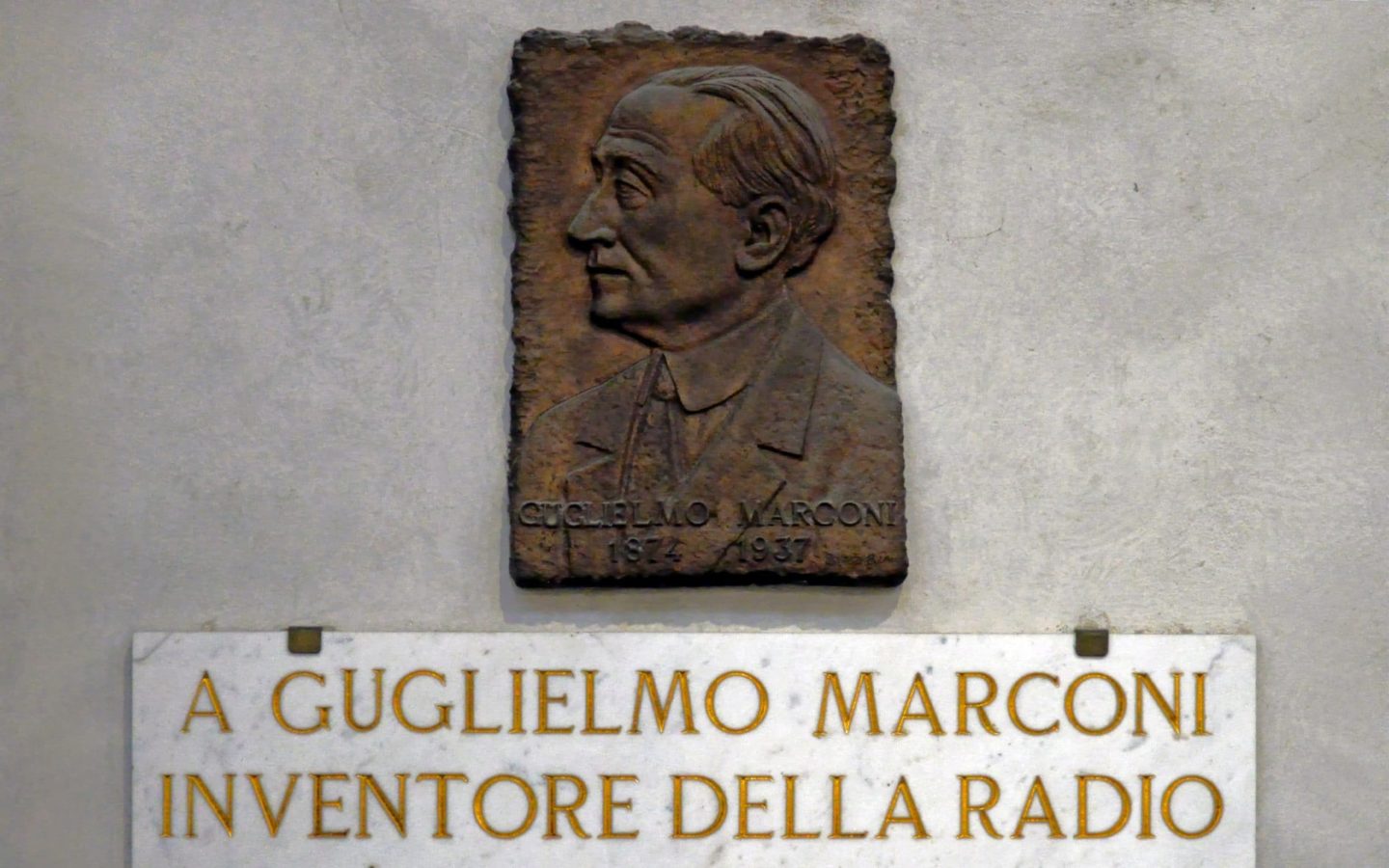
How did the Guglielmo Marconi invention change the world?
It’s easy to take radio for granted these days.
However, when you look into the history of a man like Guglielmo Marconi, you see an incredible journey designed to transform the way that we live and communicate.
Before the 20th century, the very idea of wireless transmissions was impossible. When Marconi began to experiment with the technology, he was both a pioneer and an outcast in many ways.
Marconi was way ahead of his time, too. His vision of a global network for wireless communication helped to form the digital age that we live in today.
The Marconi radio invention helped to pave the way for things like Bluetooth speakers, GPS signals, and even drones today.
Therefore, the next time you’re listening to your sleeping baby or talking on your smartphone, spare a thought for Guglielmo Marconi.
If you want to dig deeper into the science of radio, we’ve got an interesting one about What Is Shortwave Radio? Everything You Need to Know. Or maybe you want to know more about Marconi’s rival and his contribution to radio’s history instead? We have an article on The Electrifying History Of Nikola Tesla.
Radio Fidelity: For the love of radio.







